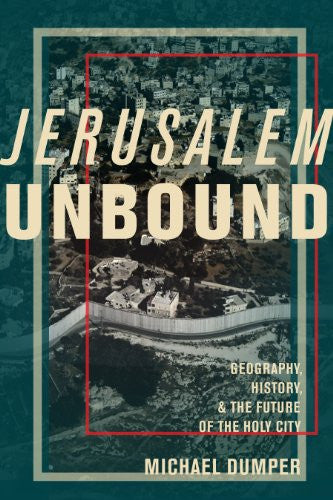Jerusalem Unbound: Geography, History, and the Future of the Holy City by Michael Dumper
$ 28.00 $ 40.00
In his latest book on Jerusalem, Jerusalem Unbound, Michael Dumper begins with the important question, “why another book on Jerusalem?” With such a plethora of literature on Jerusalem and its context on the larger Palestinian conflict, the question is valid. Interestingly, Dumper justifies his most recent of three books on the city by his recent work on the interdisciplinary project entitled Conflict in Cities and the Contested State, which has pulled together scholars in sociology, architecture, urban studies, engineering, and political science to cultivate new perspectives on Jerusalem as an urban space. The results, claim Dumper, influenced his desire to write another book on Jerusalem, this time focusing on the city as a divided city with competing and contesting borders.
Dumper draws upon previous research on divided cities, using the term to characterize Jerusalem in the same category as Belfast, Brussels, and Mostar, cities in which he continually references. He argues that Jerusalem is a special case. Not only is it a truly divided city, it also has a specific religious identity that makes the divisions much more complex than other examples. His main thesis, which he argues throughout the book, is that there are limitless borders within the city, created by ethnic, religious, political, and sectarian differences that overlap and connect in complex ways. It is not just a two-sided division between Palestinians and Israelis, but a confusing array of social and political identities and accompanying statuses.
Chapter 1 begins with a discussion of what Dumper labels “hard borders” of the city. These include borders created by walls, highways, barriers, checkpoints, and other physical barriers. Dumper examines the creation and expansion of these borders in a historical sense while also looking at how such borders affect the security infrastructure of Jerusalem and Israel’s ability to impose its military order through such infrastructure.
In the second chapter, Dumper introduces his conception of the “soft borders” of Jerusalem. Where the hard borders are visible to any observer, Jerusalem is a dizzying maze of more subtle borders, including those resulting from various education system, electoral voting patterns, and results of continued settler colonies and Israel’s incomplete annexation of East Jerusalem. Such borders affect the way that the city is lived and understood by its residents, and more often than not, soft borders contradict the apparent hard borders of the city. The result is that despite Israel’s colonial claim to the city, spaces of autonomy and uneven state control continue to dictate life for the city’s residents.
The third chapter explores the “holiness” of Jerusalem. For Dumper, it is not just the contrasts between hard and soft borders that make the city of Jerusalem so complex, but the borders created by religious practices. He argues that religious sovereignty by small enclave communities (Muslim, Jewish, and Christian alike) have created areas where Israel’s direct control comes further into question. Each community in a sense controls certain parts of the city, and such control becomes incorporated into the larger Israeli-Palestinian conflict.
Dumper spends the final two chapters outlining a detailed proposal for a peaceful solution based on his previous analysis. Because of Jerusalem’s divergent borders, a simple political solution that entails a tow-part divided city is not practical and ignores the realities of everyday life by residents of the holy city. Rather, any solution must account for hard and soft borders as well as religious autonomy by multiple communities who claim Jerusalem to be holy. Dumper eloquently argues that such complexities have rarely been addressed in peace negotiations.
It is perhaps here that Dumper’s argument becomes weakest, perhaps due to the abundance of solutions presented by various analysts or to Dumper’s sometimes overly deep knowledge of international law and the city. Yet at the same time his specific attention not to the entirety of the Palestinian-Israeli conflict, but rather on the settlement of the city of Jerusalem specifically, make his argument much more palatable and useful for genera audiences and policymakers alike. Dumpers unmatched knowledge of the everyday dynamics of Jerusalem make his insight incredibly valuable.
In sum, Jerusalem Unbound is a clearly organized, meticulously researched, highly readable guide to Jerusalem’s complex social and political landscape. Readers with an interest in political geography, urban studies, and international law will all benefit from Dumpers analysis, yet his accessible writing style will also appeal to casual readers with an interest in the holy city, its history, and its many fascinating details.
-Review by Kevin A. Davis, Bookstore Director
Year: 2014
Hardcover






Share this item: